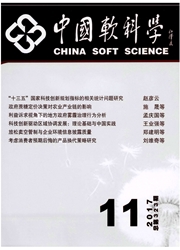

 中文摘要:
中文摘要:
随着经济全球化趋势不断加快和知识经济的兴起,国际竞争开始进入一个崭新的阶段。本文通过分析当代国际竞争的趋势和特点,揭示了当今国际竞争成败的关键不再是土地、资本和劳动力等传统生产要素,而是知识和知识产权。基于知识产权的国际竞争是当代国际竞争的本质特征。发达国家和跨国公司不仅充分利用知识生产优势,依托知识产权、品牌和标准,在国际贸易和国际分工中,牢牢掌控高附加值产业或生产环节。而且还通过知识产权战略,将知识产权保护纳入国际贸易体制,竭力维护其在全球竞争中的优势和地位。因此,为顺应国际竞争趋势,全面实施国家知识产权战略,不仅是提升我国知识产权工作的重要保证,更是转变发展方式、提高国际竞争力的基础和核心。
 英文摘要:
英文摘要:
With the acceleration of globalization and the emergence of knowledge economy, the international competition came into a new stage. In this thesis, through analyzing the characteristics of national competition in the contemporary era, the author argued that the key factor which deciding the international competition is not the traditional land, capital and labor, but the knowledge and intellectual property. Developed countries and multinational corporations not only firmly controlled over the high added - value industries or production links by their intellectual property advantages, such as intellectual property, brands and standards, but also brought intellectual property institution into the international trade system in order to maintain their predominance, therefore, to comply with the new national competition trend and carry out national intellectual property strategy is not only the key emphasis on China' s intellectual property work at present and in the future, hut also the basis and core of transforming economic development mode and promoting China' s international competition.
 同期刊论文项目
同期刊论文项目
 同项目期刊论文
同项目期刊论文
 期刊信息
期刊信息
